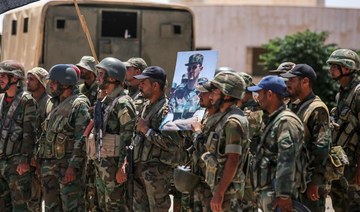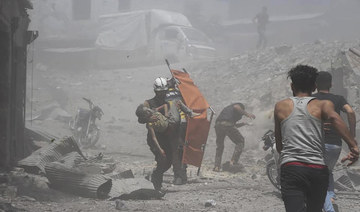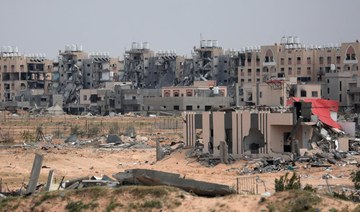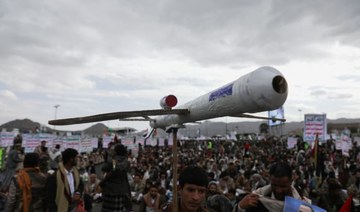UNITED NATIONS: Russia on Thursday opposed a United Nations Security Council resolution calling for an end to attacks on health facilities in Syria’s Idlib region, diplomats said after the latest meeting over violence in the country’s last major opposition bastion.
The outcome led to a rare statement following the meeting by the UN’s humanitarian chief, Mark Lowcock.
“The carnage must stop,” he said.
Russian and Assad egime aircraft have since late April ramped up deadly bombardment of the Idlib region of about three million people in northwest Syria, despite a deal to avert a massive government assault.
Kuwait, Germany and Belgium asked for the hastily called closed-door session, the latest of many they have sought since May in response to worsening fighting in Syria’s northwest.
The draft text, given to journalists, expressed “grave concern regarding the recent attacks on hospitals and other health facilities,” including a July 10 attack on Maarat National Hospital, one of the largest in the area and whose coordinates had been shared through the UN “deconfliction mechanism” that aims to spare civilian targets.
Russia again denied bombing such facilities.
“I provided information from my ministry of defense” and investigation demonstrated that there were “no attacks at nine out of eleven facilities” allegedly attacked, Moscow’s UN Ambassador Vassily Nebenzia told reporters.
“The two others were partially damaged but not by Russian” forces, he said.
His British counterpart, Karen Pierce, seemed skeptical.
“There’s some interest in an investigation into the Maarat Hospital hit. So I think that’s the thing to focus on,” she said at the end of the meeting.
“We’ve got our suspicions. But let’s get a proper look into that and get a proper answer.”
Lowcock said after the meeting that since July 1, “at least six health facilities, five schools, three water stations, two bakeries and one ambulance have been damaged or destroyed.
“Entire villages have been destroyed and emptied” because of air strikes, he said.
Regime air strikes on Tuesday killed 11 civilians in Idlib’s south, the Syrian Observatory for Human Rights said.
The region on Turkey’s doorstep is administered by Syria’s former Al-Qaeda affiliate Hayat Tahrir Al-Sham, but other jihadist and rebel groups are also present.
UN Secretary General Antonio Guterres last week strongly condemned air strikes in the region following reports from a Syrian doctors’ group that four health facilities including the Maarat Al-Numan facility were hit during a single day of bombing.
Syria’s war has killed more than 370,000 people and displaced millions since it started in 2011 with a brutal crackdown on anti-government protests.
End Syria hospital attacks, Russia told at UN
End Syria hospital attacks, Russia told at UN
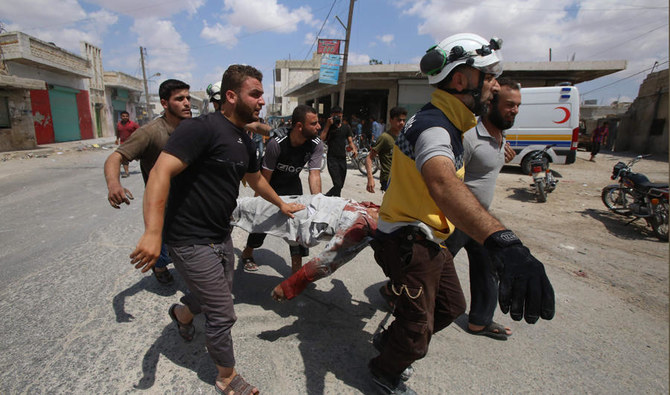
- Kuwait, Germany and Belgium asked for the hastily called closed-door session
- Russian and Assad egime aircraft have since late April ramped up deadly bombardment of the Idlib region
US sanctions four over ‘malicious cyber activity’ for Iran’s military
Tuesday’s sanctions are the latest to be levied against Tehran by the United States
WASHINGTON: The US ramped up its sanctions against Iran on Tuesday, designating four people and two companies it says were “involved in malicious cyber activity” on behalf of the country’s military.
“These actors targeted more than a dozen US companies and government entities through cyber operations, including spear phishing and malware attacks,” the US Treasury Department said in a statement.
The individuals and companies were working “on behalf of” Iran’s Islamic Revolutionary Guard Corps Cyber Electronic Command (IRGC-CEC), the Treasury said.
“Iranian malicious cyber actors continue to target US companies and government entities in a coordinated, multi-pronged campaign intended to destabilize our critical infrastructure and cause harm to our citizens,” the Treasury’s undersecretary for terrorism and financial intelligence Brian Nelson said in a statement.
“The United States will continue to leverage our whole-of-government approach to expose and disrupt these networks’ operations,” he added.
Tuesday’s sanctions are the latest to be levied against Tehran by the United States and its allies for supporting anti-Israel proxies in the Middle East and for providing military support for Russia’s war in Ukraine.
Last week, the US and Britain announced widespread sanctions against Iran’s military drone program in response to Tehran’s large-scale attack against Israel earlier this month.
That attack came in response to an April 1 air strike on the Iranian consulate in Damascus — widely blamed on Israel — that killed seven members of the Islamic Revolutionary Guard Corps, including two generals.
A day after those sanctions were unveiled, the US fined a Thailand-based firm $20 million for more than 450 possible Iran sanctions violations.
They included processing close to $300 million in wire transfers for a company jointly owned by the National Petroleum Company of Iran.
Alongside the Tuesday’s sanctions, the US Department of Justice and the Federal Bureau of Investigation (FBI) have also indicted the four individuals in question, “for their roles in cyber activity targeting US entities,” the Treasury Department said.
Egypt condemns Israeli human rights violations in Gaza Strip
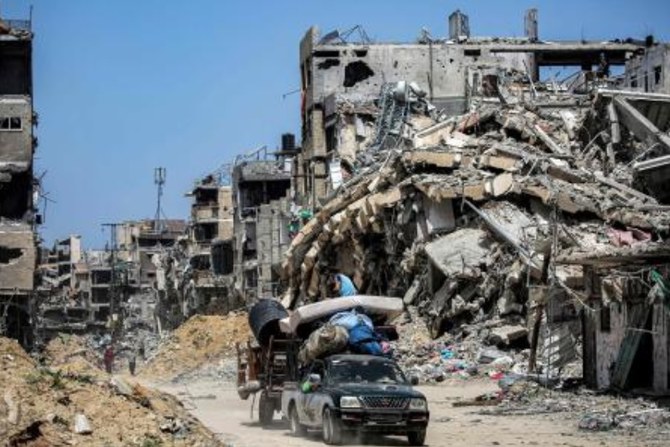
- Egypt said it condemned violations of international law including the targeting of civilians
- Abu Zeid reiterated the need for immediate intervention by the international community to stop such violations
CAIRO: Egypt has condemned the repeated Israeli violations of international law and international humanitarian law in the Gaza Strip.
The Egyptian Ministry of Foreign Affairs said: “It is regrettable and shameful that violations of international law and humanitarian values continue in such a flagrant manner in the 21st century, in full view and hearing of all countries, international organizations, and the Security Council.”
This came during statements made by ministry spokesman Ahmed Abu Zeid regarding the discovery of mass graves in the Nasser Medical Complex in Khan Yunis in the southern Gaza Strip.
Egypt said it condemned violations of international law including the targeting of civilians, displaced persons, and medical teams by Israeli forces.
Abu Zeid reiterated the need for immediate intervention by the international community to stop such violations and to conduct the necessary investigations to hold perpetrators accountable.
He added that the killing, destruction, and violence witnessed in the West Bank over the past few weeks is no less dangerous, further aggravates the crisis, and threatens to escalate tensions across all occupied Palestinian territories.
He called for an immediate halt to the violence and attacks by settlers, protected by Israeli forces, against Palestinian civilians, their property, and homes in the West Bank.
The bodies of over 200 Palestinians, including patients, have been uncovered so far in mass graves at the Nasser Medical Complex in Gaza’s Khan Younis since Saturday, according to media reports.
Hezbollah drones target northern Acre in response to Israeli strikes on Lebanese group
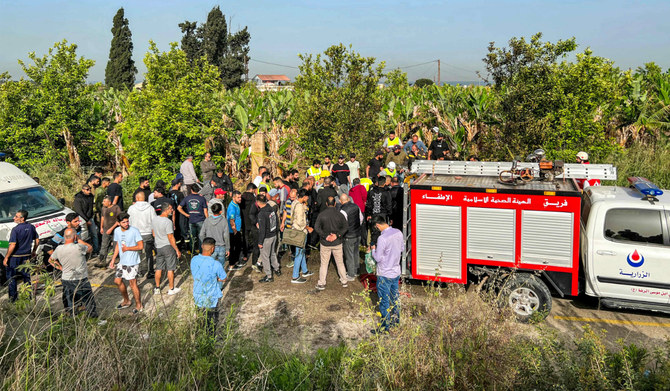
- Israeli media reported that “those present on the beach were evacuated after a Hezbollah drone was intercepted in the skies over Nahariyya and Acre”
- Israeli army had said it killed “two significant terrorists in Hezbollah’s aerial unit”
BEIRUT: Hezbollah forces in south Lebanon on Tuesday launched a combined aerial attack with diversionary and assault drones on Israeli military targets.
The focus of the Lebanese group’s attack was the headquarters of the Golani Brigade at the Shraga barracks, north of the city of Acre.
The attack was described as “a new qualitative strike against an Israeli site,” using drones said to be able to bypass Israeli radar and avoid Iron Dome missiles.
A security source told Arab News that the attack was “a sensitive targeting.” The area struck is more than 15 km from the border with Lebanon.
“This targeting took place in broad daylight while the Israelis were celebrating the Jewish Passover,” the source said.
Hezbollah said it launched the drones “in response to Israeli aggression against the Lebanese town of Aadloun and the assassination of a (Hezbollah) cadre there.”
Videos on social media showed explosions and smoke rising north of the coastal city of Acre, with beachgoers fleeing in all directions.
Israeli media reported that “those present on the beach were evacuated after a Hezbollah drone was intercepted in the skies over Nahariyya and Acre.”
A few hours after Hezbollah’s strike, Israeli warplanes carried out an airstrike on the town of Hanin, 7 km north of Bint Jbeil. It destroyed a two-story family house.
Initial reports said there were two casualties, including a woman, and five were wounded, some seriously, including women and children. The injured were transferred to hospitals.
Meanwhile, an Israeli military drone struck a car between the towns of Adloun and Al-Kharayeb, killing Hussein Ali Azqul, who reports suggested was an engineer working in Hezbollah’s air defense unit.
The group was left mourning a second member, Mohammed Khalil Attiya, from Qana, who died from injuries received a few days ago. The Israeli army described him as a “leader in the Radwan Force (a Hezbollah special unit).”
In ongoing cross-border clashes between Hezbollah and Israeli forces, the former said it had attacked “a gathering of Israeli enemy soldiers in the vicinity of Al-Asi,” to which Israeli fighter jets retaliated with airstrikes on the towns of Blida and Hula.
Israeli airstrikes continued relentlessly on Tuesday night, striking Yaroun and Al-Aishiya as well as other districts in south Lebanon.
The Israeli military also launched flash bombs over villages in the western and central areas, extending to the outskirts of Tyre, and on Tuesday morning fired heavy weapon rounds toward the towns of Naqoura and Jabal Al-Labouneh.
Houthi threats continue but attacks on ships in Red Sea appear to be on hold
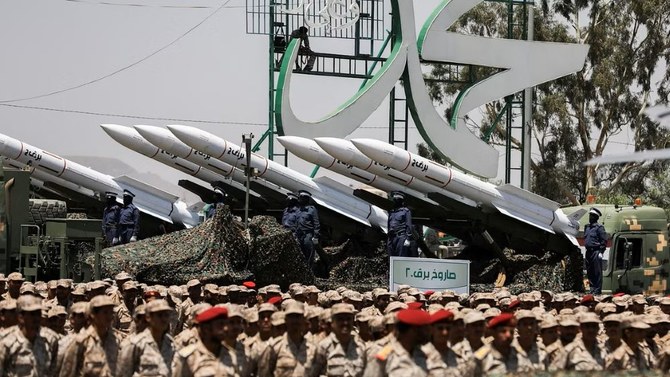
- Observers speculate the militia might be running out of drones and missiles, or air strikes by US and UK could have damaged launchers
- Houthis have claimed credit for significantly fewer assaults this month and international marine agencies have reported a decline in the number of strikes
AL-MUKALLA: Despite ongoing threats by Houthi leaders in Yemen that they will continue to attack international shipping in the Red Sea, the number of strikes on vessels has drastically fallen in recent weeks.
The group has not claimed credit for any assaults on ships since April 10. Analysts speculate that the militia might be running out of missiles and drones, or air strikes on Houthi targets by the US and UK could have damaged their launchers.
Since November, the Houthis have launched hundreds of drones, ballistic missiles and remotely controlled and explosive-laden boats at international commercial and naval ships in the Red Sea, Bab Al-Mandab Strait and the Gulf of Aden. They say they are acting in support of the Palestinian people and the aim is to force Israel to allow more humanitarian aid to enter the Gaza Strip.
Compared with the early days of their campaign, the Houthis have claimed credit for significantly fewer assaults this month, and international marine agencies have reported a decline in the number of strikes.
The organization UK Maritime Trade Operations, which records attacks on shipping, has not received any notifications of incidents in the Red Sea or Gulf of Aden since April 7, one of the longest periods with no reported attacks since the start of the Houthi campaign almost six months ago.
The US Central Command last reported intercepting Houthi missiles and drones on April 16. Prior to that it had been issuing almost daily notifications.
Despite the decline in attacks on shipping, the Houthis’ Political Office said on Monday it had instructed its military forces to escalate attacks in the Red Sea and Arabian Sea on ships linked to or bound for Israel in response to what it described as “genocide crimes” committed by Israel against Palestinians in Gaza.
Mohammed Al-Basha, an expert on the Middle East with the Navanti research group in the US, cautioned that the recent extended period without any claims of attacks does not necessarily mean the Houthis have halted their attacks in the Red Sea.
“The absence of frequent daily claims could also represent a strategic decision or the possibility of diplomatic or secret talks, rather than an operational inability,” he wrote in a message posted on social media platform X.
“This might suggest that the missile stockpile of the Houthis is diminishing, while the production of drones remains steady.”
Yemeni military analyst Brig. Gen. Mohammed Al-Kumaim suggested airstrikes in recent months by US and UK forces might have diminished the capability of the Houthis to launch attacks, and said the group might be settling into a war of attrition.
“The US may have targeted the few mobile missile launchers belonging to the Houthi militia; they need three or four launchers if they have 100 missiles,” he told Arab News.
The UN’s special envoy for Yemen, Hans Grundberg, said on Monday he held talks with Houthi negotiator Mohammed Abdul Sallam and Omani officials in Muscat to explore ways in which to advance a UN-brokered peace plan for Yemen while also reducing wider tensions in the Middle East.
Abdul Aziz Al-Bukair, a Houthi government minister of state, said the militia’s representatives discussed with Grundberg their recent negotiations with Saudi authorities, as well as issues such as payment of wages to public-sector workers, the reopening of key roads in Yemen, and oil exports.
The ongoing, UN-led peace efforts to end the near decade-long war in Yemen suffered a severe blow when the Houthis began attacking ships in the Red Sea in November.
Iran threatens to annihilate Israel should it launch a major attack
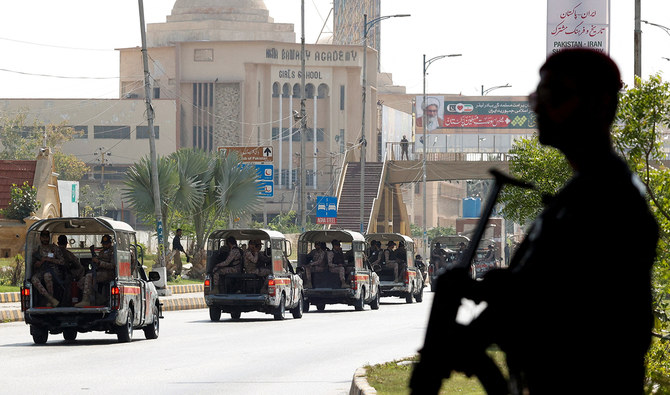
- Explosions were heard over Iran’s Isfahan city Friday in possible Israeli attack
- But Tehran played down the incident and said it had no plans for a retaliation
DUBAI: An Israeli attack on Iranian territory could radically change dynamics and result in there being nothing left of the "Zionist regime", Iran's President Ebrahim Raisi was quoted as saying on Tuesday by the official IRNA news agency.
Raisi began a three day visit to Pakistan on Monday and has vowed to boost trade between the neighbouring nations to $10 billion a year.
The two Muslim neighbours are seeking to mend ties after unprecedented tit-for-tat military strikes this year.
On Friday, explosions were heard over the Iranian city of Isfahan in what sources said was an Israeli attack, but Tehran played down the incident and said it had no plans for retaliation.
Iran launched a barrage of missiles and drones at Israel on April 13 in what it said was retaliation for Israel's suspected deadly strike on its embassy compound in Damascus on April 1, but almost all were shot down.
"The Islamic Republic of Iran will honourably continue to support the Palestinian resistance," Raisi added in the speech in Lahore.



